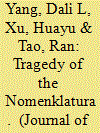| Srl | Item |
| 1 |
ID:
100999


|
|
|
|
|
| Publication |
2010.
|
| Summary/Abstract |
This article examines central-provincial relations in the context of greater centralization. Focusing on the background of provincial leaders, the leadership management system, and the fiscal system, it suggests that there has been an unmistakable trend toward greater central control. However, greater centralization has coexisted with decentralization in many areas of governance. While greater centralization has not completely changed the particularistic character of central- provincial interactions, the arena has shifted to bargaining and lobbying for central largess. Provincial bargaining now occurs in a context in which the central government is in control of considerably greater resources and more capable of setting the rules of the game. This study of the central-provincial relations helps to contextualize the study of Hong Kong's relationship with Beijing first by pointing to their different natures and characters. At the same time, salient developments in central-provincial relations in the main body politics also form the context for Hong Kong's relationship with Beijing.
|
|
|
|
|
|
|
|
|
|
|
|
|
|
|
|
| 2 |
ID:
133813


|
|
|
|
|
| Publication |
2014.
|
| Summary/Abstract |
We review James Kung and Shuo Chen's study, published in the American Political Science Review, on the causes of China's Great Leap Famine (1959-1961). Kung and Chen explain the variations in provincial leaders' radicalism on the basis of the career incentives facing the provincial First Secretaries. In this article, we question the validity of their basic assumptions and also uncover serious issues with the Kung and Chen dataset. We conclude that their empirical findings were based on faulty foundations. Our alternative hypothesis instead explains the dynamics of political radicalism during the Great Leap Forward in terms of the provincial leaders' political loyalty to Mao. Our findings point to the significance of political networks in influencing the behavior of elites and, by extension, political and socio-economic outcomes.
|
|
|
|
|
|
|
|
|
|
|
|
|
|
|
|